Table of Contents
15 Best DIY Natural Cleaners for a Safer, Healthier Home
This page may contain affiliate links. We may earn a commission on purchases, at no additional cost to you. Learn more →
Cleaning your home can feel like an endless (and thankless) chore, but a few small changes can help you go from angry scrubbing to self-care for your sanctuary. One way to do this is to opt for natural cleaners over the harsher commercial alternatives.
Natural cleaners usually opt for simpler ingredients, but the non-toxic cleaning solutions available in the store can be expensive and sometimes not even as effective. Thankfully, you can make a quick and easy solution in your own home, using safe and tested ingredients that you can get from any store.
In this guide, you'll discover how to make homemade all-purpose natural cleaning recipes and natural alternatives to harsh commercial products. We'll explore easy DIY solutions for every corner of your home, from the kitchen to the bathroom and beyond.
Ready to transform your cleaning routine?
Why Choose Natural Cleaners?
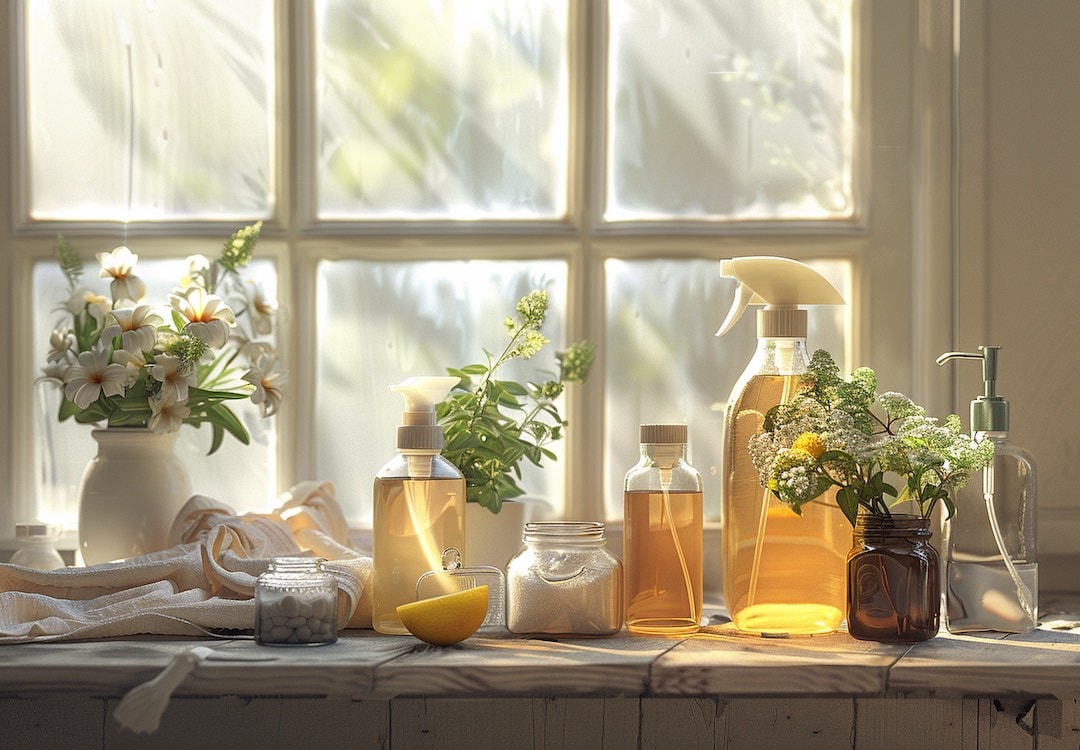
Commercial and professional cleaning products often rely on harsh chemicals to get the job done. These include scary substances like ethylene glycol, phosphates, ammonia, bleach, and volatile organic compounds (VOCs). VOCs in particular have the potential to cause respiratory damage, increase your risk of cancer, or even have developmental and reproductive impacts.
If you’ve ever had a hard time breathing while using a commercial spray, you’re not alone. Recent studies have found that employees who use professional cleaning products tend to have more respiratory issues like asthma. Nearly 75% of the products involved were irritants, and over 25% of them were corrosive.
While these chemicals can be effective, they’re not the type of substances you want around the areas where you eat and relax. Natural cleaners, on the other hand, offer a gentler and healthier alternative that can keep these sensitive areas clean without the detrimental effects.
Making the switch to non-toxic products helps remove these hazards from your home, protect your health, and improve the air quality in your living space by cutting out dangerous chemicals like VOCs.
Natural cleaners offer numerous benefits:
-
Reduce exposure to harsh chemicals
-
Improve indoor air quality
-
Save money on cleaning products
-
Customize scents with essential oils
-
Reduce plastic waste from cleaning product containers
-
Safe to use around children and pets
Can I make my own cleaning products?
Yes! For some applications, DIY natural cleaners are a simple alternative that is easier on the environment and your wallet.
Essential Ingredients for Natural Cleaners
The Power of Baking Soda: Natural Abrasive and Odor Absorber
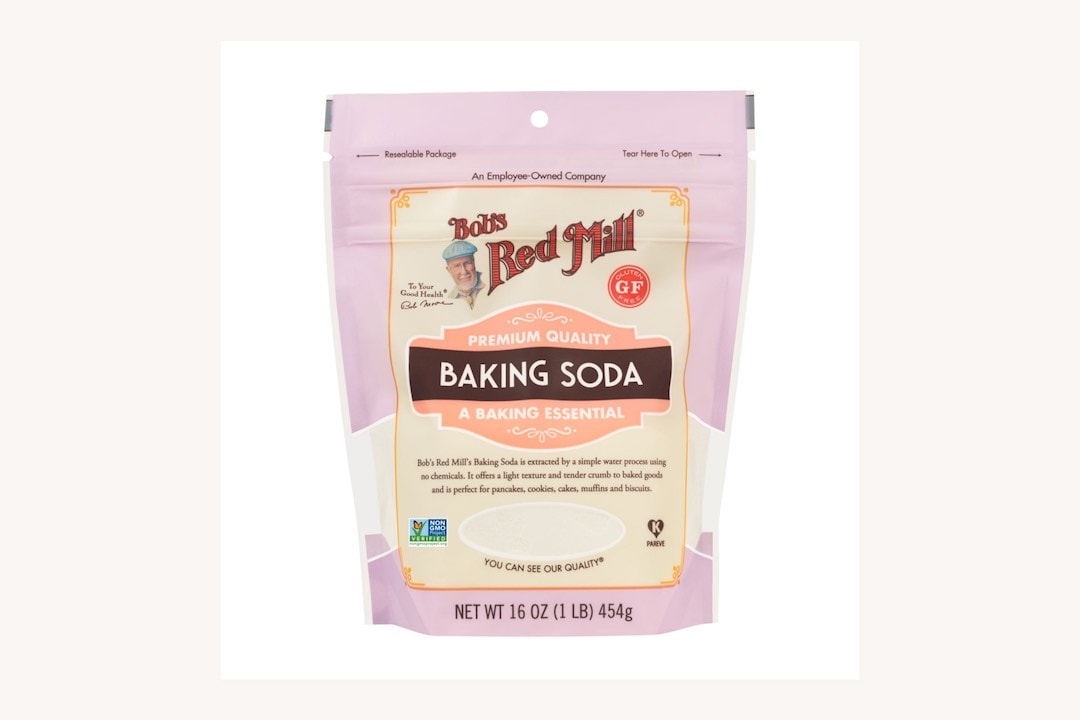
Baking soda is a staple of nearly all homemade natural cleaners. It's mildly alkaline, which makes it a perfect match against strong odors that come from strong acids (like sour milk).
Baking soda neutralizes these odors instead of just covering them up, making it a natural odor absorber and deodorizer. You can even use it to deodorize those plastic food containers that have absorbed stubborn food smells.
You can add baking soda to water to make an easy-to-spray solution, or you can sprinkle it on a sponge to use the particulates as a natural abrasive to scrub off stubborn grime.
Baking soda is safe and versatile enough to use on glass, chrome, steel, and plastic, which means you can use it nearly everywhere in your home: from your sinks to your tubs, tile, microwaves, and even some fabrics! It’s also non-toxic, which means you can use it around pets and children worry-free.
If you need a brand to start with, we recommend Bob's Red Mill Baking Soda *
Unlocking the Potential of Essential Oils: Natural Fragrances and Antimicrobial Properties
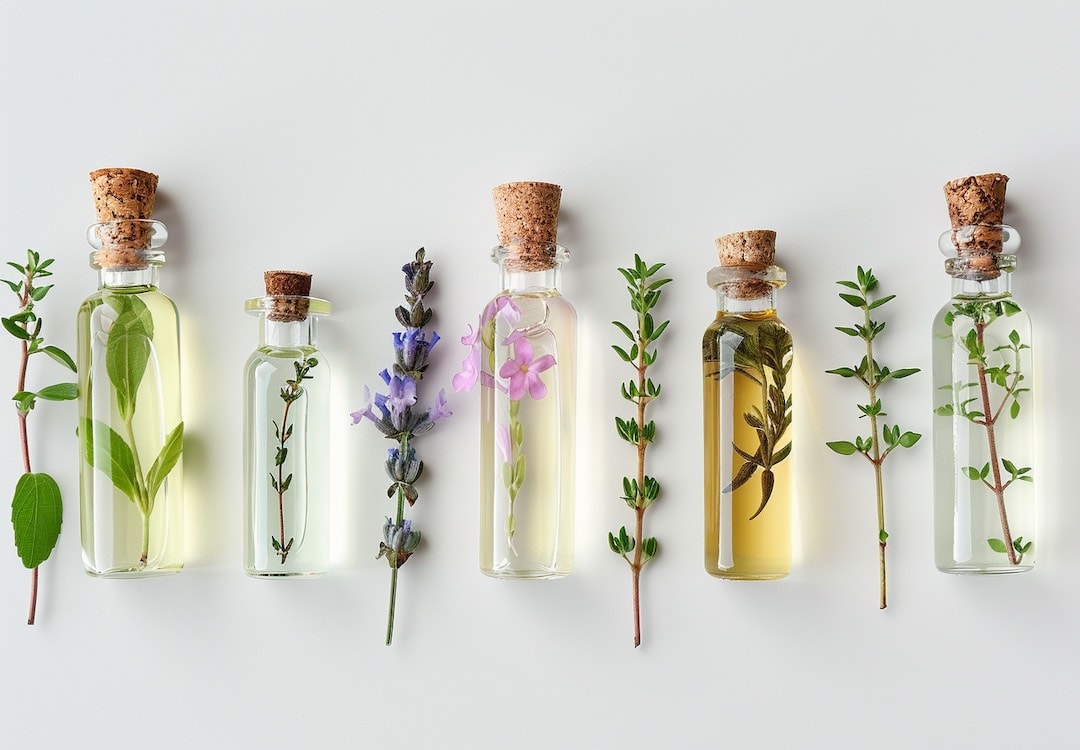
Essential oils are another cornerstone of most natural cleaner recipes, and for good reason.
First—they smell good! That may seem obvious, but scent can be a powerful way to upgrade your home. Making your living space smell good not only makes it pleasant, but it can also have therapeutic benefits as well (which is the main idea behind aromatherapy). Certain scents (like lavender) can bring a calming presence to your home
Different oils can also have different effects. For example,
-
Tea tree oil and cedarwood oils can help clean soiled laundry.
-
Peppermint oil has antibacterial and antifungal properties that can make it a good disinfectant (while also warding off insects and other pests at the same time).
-
Lemon oil is a common favorite for spot-cleaning wood and leather furniture.
You can mix different essential oils to get the scent combination that you prefer—there’s almost never a wrong answer! A little also goes a long way. Add a few drops of oil to your natural cleaner solution and watch how it instantly elevates your cleaning experience. If you’re new to the power of essential oils, sets like the Plant Therapy set* can help get you started.
What are some natural disinfectants?
While research is still ongoing, studies indicate that natural cleaners can help disinfect your surfaces—as long as they’re used properly.
Natural disinfectants can include alcohol, hydrogen peroxide, vinegar, hot water, and even some essential oils. These alternatives are often gentler than the commercial options and have been shown to kill certain strains of viruses and bacteria.
-
Hydrogen peroxide can kill viruses and bacteria, according to the Centers for Disease Control (CDC). You can use the 3% concentration off the shelf or dilute it down to 0.5%. Leave the solution on the surface for 1 minute before wiping clean.
-
Vinegar (or more specifically, the acetic acid in vinegar) can reduce bacteria. A 2010 study found that 10% malt vinegar can reduce the flu virus, and a subsequent 2014 study found that 10% solution could kill the bacteria that causes tuberculosis.
-
Essential oils like patchouli, peppermint oil, and cinnamon can kill some pathogens.
Natural disinfectants generally take longer to take effect and are not always as effective as commercial options (like bleach), However, if you need a gentler alternative, these natural options can help you clear away some pathogens from your day-to-day surfaces.
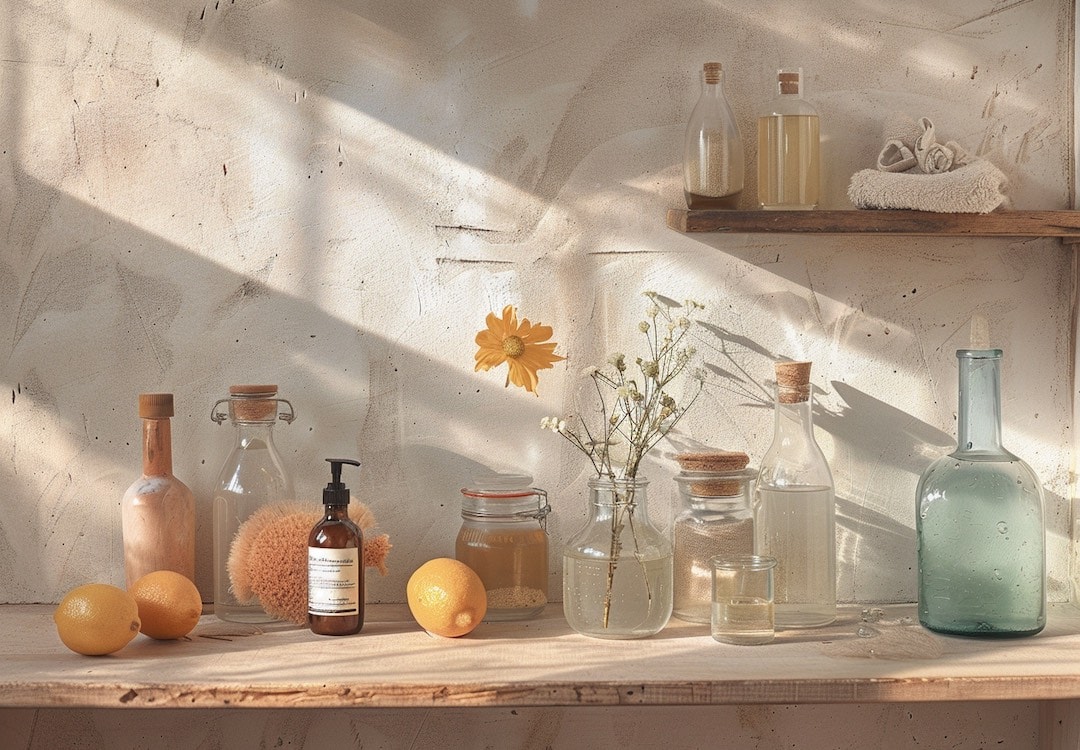
Getting Started with Homemade Cleaners
Must-have Natural Cleaning Essentials
To start your natural cleaning journey on the right foot, be sure to stock your cleaning caddy with these household ingredients first
-
Baking soda
-
Vinegar
-
Washing soda
-
Castile soap (i.e Dr. Bronner's* )
-
Lemon juice
-
Mason jar
-
Glass spray bottle
-
Funnel (HIGHLY recommended)
-
Non-toxic liquid dish soap (like Dawn)
-
Essential oils (either a kit like Plant Therapy set * or a set of basics: lemon, tea tree, etc)
You can pick up most of these ingredients at your local grocery store. Once you’ve compiled your stash, now it’s time to learn how to use these common pantry ingredients to make your cleaners.
Editor’s Tip: Starting Small with Homemade Cleaners Using a Spray Bottle
There are a lot of creative recipes out there, but for your first attempt at making natural cleaner, a simple spray bottle recipe is a great place to start. These homemade cleaners that use glass spray bottles* generally only need two to three ingredients, work on most surfaces, and most importantly, help you get a better understanding of the basics. You’ll get a feel for how these ingredients interact and how much you’ll need.
This is especially important when you’re using essential oils. Remember how a little goes a long way? If you accidentally add a few drops too many, you’ll have way more fragrance than you expected. Maybe the oil combination you chose isn’t something you like long-term after all. It’s always better to start small and test out your ideas before making big batches.
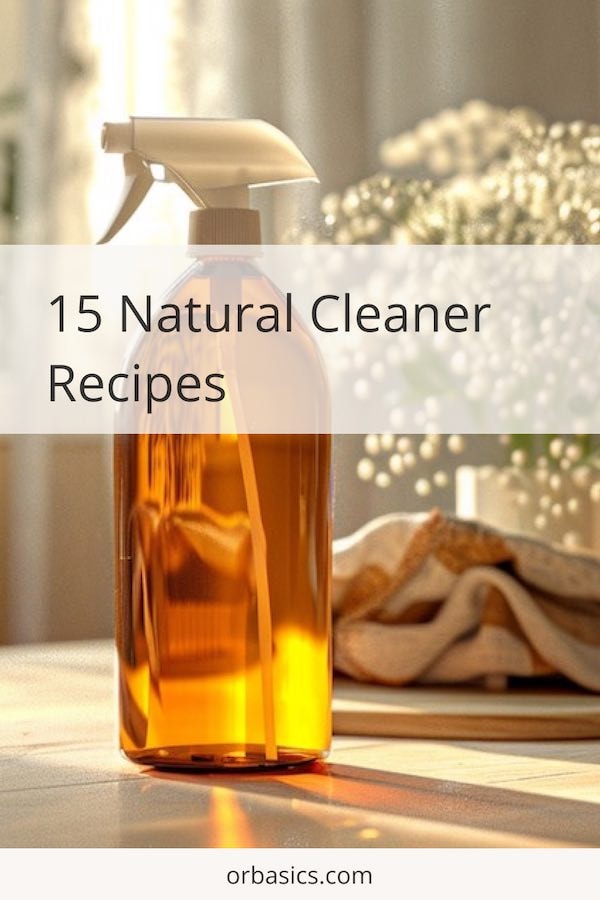
What is the best DIY cleaner?
Often, the best DIY cleaners are deceptively simple. This homemade cleaner can be made in less than five minutes, can be used on nearly all your hard surfaces, and only takes two ingredients: non-toxic liquid dish soap and vinegar.
How do you make homemade cleaner with (non toxic) dawn* and vinegar?
For a quick, simple homemade cleaner with non-toxic ingredients, try the following:
-
Microwave (or otherwise warm) a cup of vinegar and then combine it with one cup of dish soap (like Dawn) into a spray bottle.
-
Gently swirl it to mix thoroughly, but DON’T shake it—too much motion will create a bubbly mess.
-
To use, spray liberally on your shower, tub, sink, or other hard surface. Let it sit for a few minutes, and then wipe away to reveal a sparkly clean surprise!
Now that we've covered the basics, let's start with the most versatile cleaner in your arsenal.
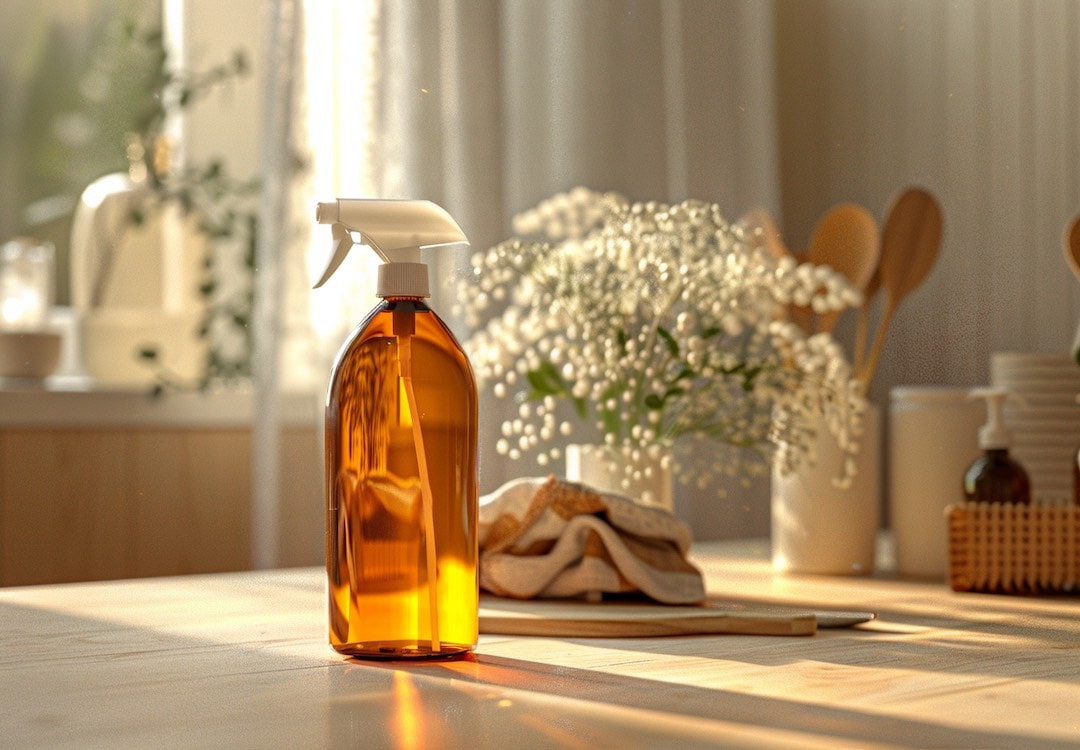
All-Purpose Cleaning Recipes
If you want a natural cleaner that can be used almost anywhere in your home, you'll want to start with an all-purpose cleaning recipe. This type of cleaner can be used on most hard surfaces and even on some stains. Learn how to create an easy homemade all-purpose cleaner recipe using common household ingredients
What is the best homemade all-purpose cleaner recipe?
Most natural all-purpose cleaner recipes follow the same formula.
-
1 cup hot water
-
1 cup vinegar
-
5 drops of your favorite essential oil (lemon, lavender, and tea tree are all popular options)
To make your all-purpose cleaner, go through the following steps:
-
Mix your vinegar and water into your spray bottle.
-
If you like, add a few drops of essential oil to add a pleasant scent.
-
Swirl to mix thoroughly and then you’re ready to clean!
Simple, easy, and versatile. You can use this cleaner on your countertops, glass, and even your floors.
Customizing Your Cleaner with Essential Oils for a Fresh Scent
Essential oils are an easy and potent way to elevate your natural cleaners. You can add your favorite scent to make your home smell amazing, or you can choose various oils for their unique properties. Lemon oil and tea tree oil are popular for cleaning recipes to use on practically any surface.
Adding essential oils to your homemade all-purpose cleaner is a piece of cake! Simply add about 5 drops, mix, and apply.
With your all-purpose cleaner mastered, let's move on to tackling the toughest rooms in your home.
Kitchen and Bathroom Cleaning Recipes
The kitchen and bathroom often require special attention. Here, we'll explore natural oven cleaner alternatives and eco-friendly toilet bowl cleaner solutions that are both effective and safe
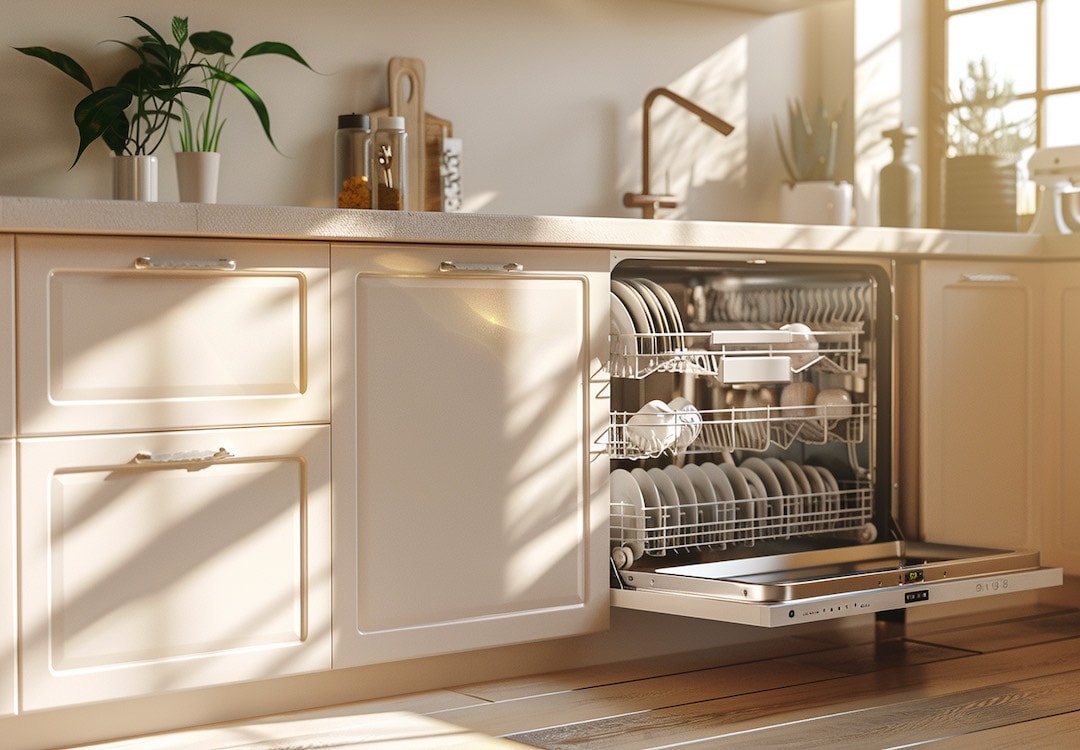
Homemade Dish Soap and Dishwasher Detergent
You can also make your own dish soap and dishwasher detergent using natural ingredients.
For an alternative to the harsh chemicals in commercial dish soap and dishwasher detergent, try out this natural cleaning recipe:
-
1 cup washing soda
-
1 cup baking soda
-
1 cup salt
-
¼ cup citric acid
-
30 drops lemon essential oil
After compiling your ingredients, complete the following steps:
-
Combine your dry ingredients in a mixing bowl and add about 30 drops of essential oil.
-
Mix with a fork until there are no clumps.
-
Store the final mixture in a mason jar or other airtight container.
-
To use your detergent, place a tablespoon of the power in the detergent dispenser of your dishwasher or sprinkle on a damp sponge.
Natural Oven and Drain Cleaners
No one likes those grimy food particulates that build up inside our oven, but thankfully there’s a natural oven cleaner alternative that can help get your appliance nice and sparkly again! Baking soda is the key ingredient here. Its alkalinity and abrasive nature means that it helps break down the acidic grease and scrubs off stuck-on grit with ease.
Start with:
-
½ cup baking soda
-
3 tablespoons water
Then, complete the following:
-
Combine to make a paste (about the same consistency as pancake batter).
-
Remove the racks from your oven and spread the paste over the dirty metal and glass parts of your oven. (Note: avoid your heating elements).
-
Let the mixture sit for 15-20 minutes and then wipe away with a wet paper towel. You can also use a 3:1 mixture of water and distilled vinear for an extra-thorough clean.
But how about for those stubbornly clogged drains? The solutions on the market can be harsh on your pipes (and your nose!) Drains often get clogged with old scraps of food and organic matter, which means that once again, baking soda is your friend.
For a natural drain cleaner, try this:
-
½ cup baking soda
-
½ cup vinegar
-
½ cup lemon juice (optional)
Then you'll want to do the next steps:
-
Start by pouring the baking soda directly into your drain, followed by the vinegar. (If you want a more pleasant fragrance, add your lemon juice).
-
Once the vinegar hits the baking soda, it will start a bubbly reaction that emits CO2.
-
Plug the drain and let the bubbles gently scrub your pipes from the inside.
-
After 10-20 minutes, rinse the drain with hot water and enjoy your freshly unplugged plumbing!
Toilet Bowl Cleaner and Mirror and Glass Cleaner
Do you have to reach for harsh chemicals to get your toilet or your glass surfaces streak-free and shiny? Not anymore!
First, let’s start with this simple two-step spray recipe for a natural homemade toilet bowl cleaner:
-
1 cup vinegar
-
1-2 tablespoons baking soda
Next, continue on to:
-
Pour your vinegar into a spray bottle and spray liberally into your toilet bowl.
-
Let the mixture sit for 15 minutes.
-
Sprinkle your baking soda into the toilet bottle to make a fizzy lather.
-
If desired, scrub the bowl to use the baking soda particulates as a natural abrasive and odor absorber.
Flush, and voila!
But how about glass cleaner—can natural cleaners stand up to Windex? As it turns out, yes! Try out the following:
-
3 tbsp white vinegar
-
2 tbsp rubbing alcohol
-
1 1/2 cups water
Pour your vinegar and rubbing alcohol into a glass spray bottle using a funnel. Slowly add your water and shake it to mix. Next, spray, wipe, and see the difference!
Sometimes you need a cleaner tailored to a specific surface or stain. Here are some recipes for those special cleaning challenges
Specialized Cleaning Recipes
Sometimes you need cleaners for specific purposes. In this section, you'll find out how to make a DIY carpet stain remover and natural wood polish spray, among other specialized solutions.
Carpet Stain Remover and Carpet Freshener
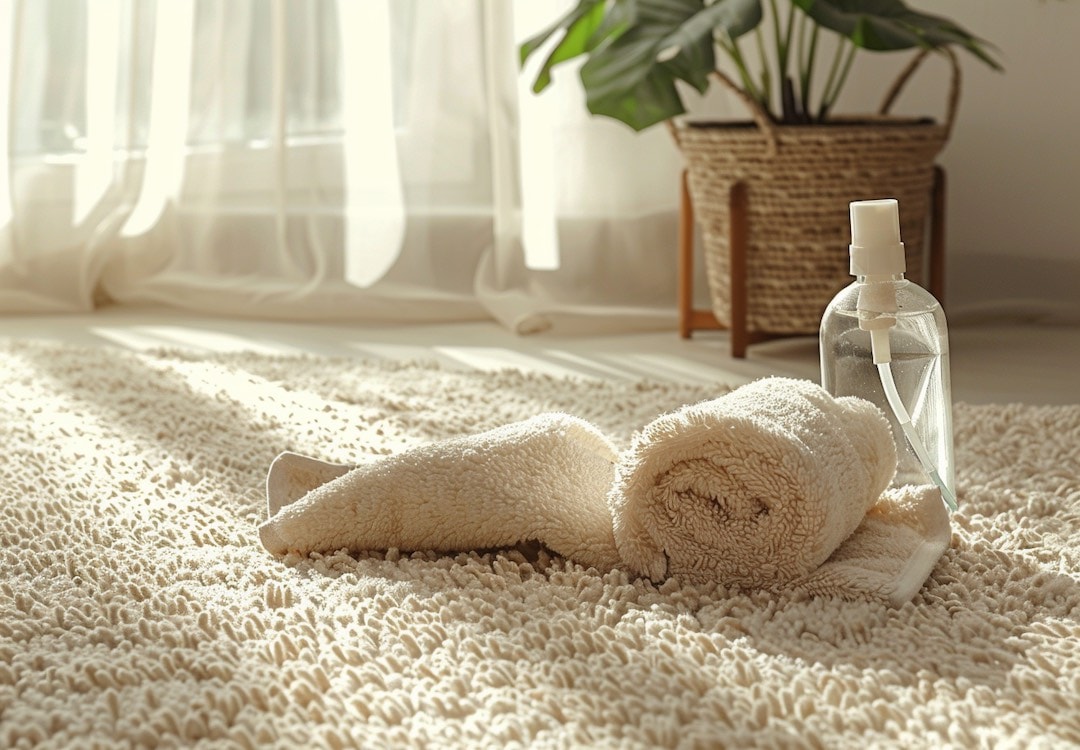
What about those pesky stains that happen on your carpets? Life happens, and when it does, there’s a natural cleaning solution that you can whip up quickly to get those hard-to-get stains out of your carpeting.
For a natural carpet stain remover using natural ingredients, try the following:
-
1-2 cups vinegar
-
1 cup of water
-
2-3 drops of dye-free dish soap (optional)
-
2-5 drops of your favorite essential oils
-
Spray bottle
From there, complete the following steps:
-
Pour the vinegar into a spray bottle and dilute with 1 cup of water.
-
If you like, add 2 or 3 drops of your liquid dish soap for an extra cleaning kick.
-
Finish off with a few drops of your favorite essential oil for fragrance.
-
Spray generously onto any stain and let it soak for a few minutes. Blot it up with a cloth or paper towel, and watch the mess disappear.
In a pinch, you can simply add dry baking soda onto your fresh carpet stain. Baking soda can help break down the spill, although it will take some time. Pour a layer of baking soda on the stain and rub it into the fibers before leaving it to sit for a few hours (or even overnight). Vacuum up the powder to finish.
What if your carpet just needs a little freshening in between shampoos? You can make an easy carpet freshener by combining one cup of baking soda with 10-30 drops of essential oil. Mix evenly and then disperse the powder over your carpet before vacuuming to absorb lingering odors and leave your carpets pleasantly fresh.
Wood Polishing Spray and Dusting Spray
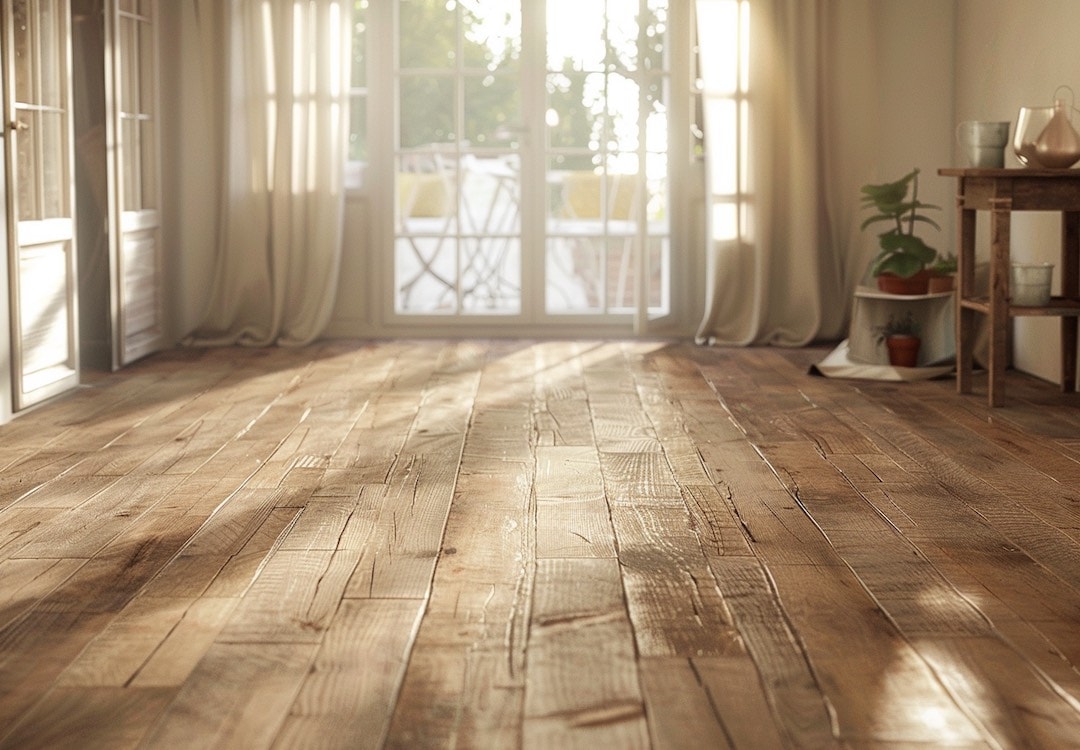
Wood can be a sensitive substance to clean, but there are natural options.
For an easy wood polishing spray combine:
-
1 1/2 – 3/4 cup distilled water
-
1/8 -1/4 cup white vinegar
-
2 tablespoons olive oil
-
20 drops of lemon essential oil
Pour all ingredients into a glass spray bottle and swirl to mix. To use, spray directly onto your wood surfaces and floors and wine away with a wood polish rag or microfiber cloth.
If you need an easy dusting spray, start with:
-
½ cup white vinegar
-
2 cups warm water
-
¼ cup olive oil
-
2-5 drops of essential oil (optional)
Next, complete the following:
-
Combine all ingredients into a glass spray bottle.
-
After wiping away excess dust with a microfiber cloth, spray the mixture onto your surfaces. This will both collect any hidden dust particles and create a natural barrier to stop dust from collecting.
Natural Stone Cleaner and Grease Cleaner
While you can often clean natural stones like granite with just a damp sponge, sometimes you need something a little extra to get up the grime. In those cases, try this simple recipe:
-
¼ cup rubbing alcohol
-
3-5 drops liquid dish soap
-
1½ cups distilled water
-
5-10 drops essential oils (optional)
To make this cleaner, complete the following:
-
Combine the alcohol, dish soap, and essential oils into a spray bottle and swirl together.
-
Add the water to dilute and shake thoroughly.
-
To apply, spray onto your stone surfaces and wipe with a cloth or sponge.
If you need a degreaser with a little extra kick, we have you covered! Start with the following:
-
1 cup distilled white vinegar
-
2-3 drops of natural liquid soap
-
1 tablespoon baking soda
-
2-10 drops of essential oil
Combine your vinegar, dish soap, and baking soda into a spray bottle, and then add water to the bottle until it is full up to the neck. Add your essential oil carefully, cap the bottle, and then shake vigorously to mix.
To use, simply spray the mixture onto your dirty surface and then wipe up with a sponge.
What is the best homemade floor cleaning solution?
For an easy floor cleaning solution with all-natural ingredients, combine:
-
½ cup white vinegar
-
1 teaspoon olive oil
-
1 cup water
-
2-3 drops of essential oils
Combine all ingredients into a spray bottle and shake well. Spray onto a cleaning cloth and rub onto the floors for a nice shine and smell all throughout your home.
See some homemade natural cleaning recipes in action here
Conclusion
The Benefits of Switching to Homemade Natural Cleaners
Natural cleaners are not only better for the environment (and your body), but they’re generally gentler on your hands and nose. They use naturally sourced fragrances with simple ingredients, so you can have an eco-friendly solution with the same cleaning power.
These types of cleaners are perfect to help you embrace non-toxic living without breaking the budget. Using them is a gentle, cozy, pleasant experience–which means cleaning your home is no longer a harsh undertaking, but an extension of the cozy sanctuary you’ve worked hard to cultivate.
By switching to these homemade natural cleaners, you'll create a safer, healthier home environment while saving money on store-bought products.
More Cleaning Recipes and Resources for a Healthier Home
If you're looking for more cleaning recipes and resources for a healthier home, including DIY cleaners and natural cleaning tips, be sure to check out some of our other blogs, including this handy guide on non-toxic detergents or non toxic store bought cleaners!
You can also check out some of the following channel for more recipes in action:
7 DIY All Natural Cleaning Products for a Non-Toxic Home | DIY Laundry Detergent, Dish Soap & More
If you enjoyed this post, check out these other articles on safe and non toxic products:
-
Guide to Non-Toxic Candles: the Best 16 Natural Candle Brands
-
11 Best Non Toxic Air Fresheners for a Safe and Healthy Home
Frequently Asked Questions About Homemade Cleaners
What is a homemade cleaning agent?
Homemade cleaning agents are solutions that you can make with ingredients found in your typical store or pantry. You won't need specialized expertise or a chemistry background to make these cleaners work for you.
What is a good natural cleaner?
Baking soda and vinegar are basic staples. Also consider stocking up on washing soda, natural liquid dish soap, and essential oils.
Do homemade cleaners really work?
Yes! Using natural, non-toxic ingredients can help get your surfaces clean and ready to use, even around children and pets.
*The links are so-called 'affiliate links.' This means if you click on one of these links and make a purchase, we may receive a small commission at no extra cost to you, which in turn helps us to further develop the blog and create even more useful and valuable content for you!
Orbasics Gmbh is also a participant in the Amazon Services LLC Associates Program, an affiliate advertising program designed to provide a means for sites to earn advertising fees by advertising and linkingto amazon.com.













